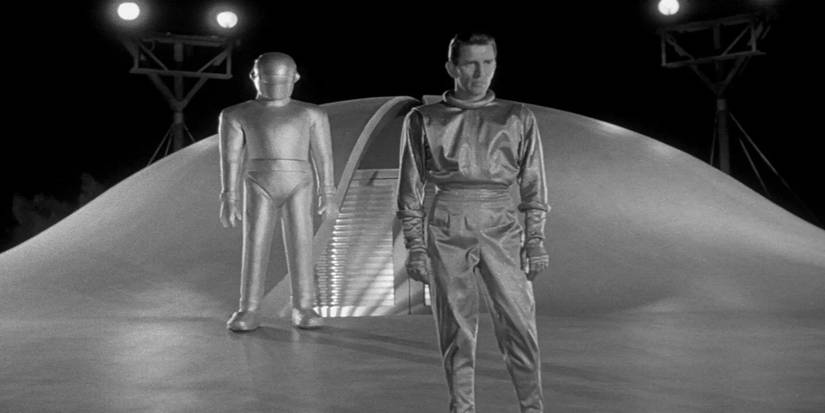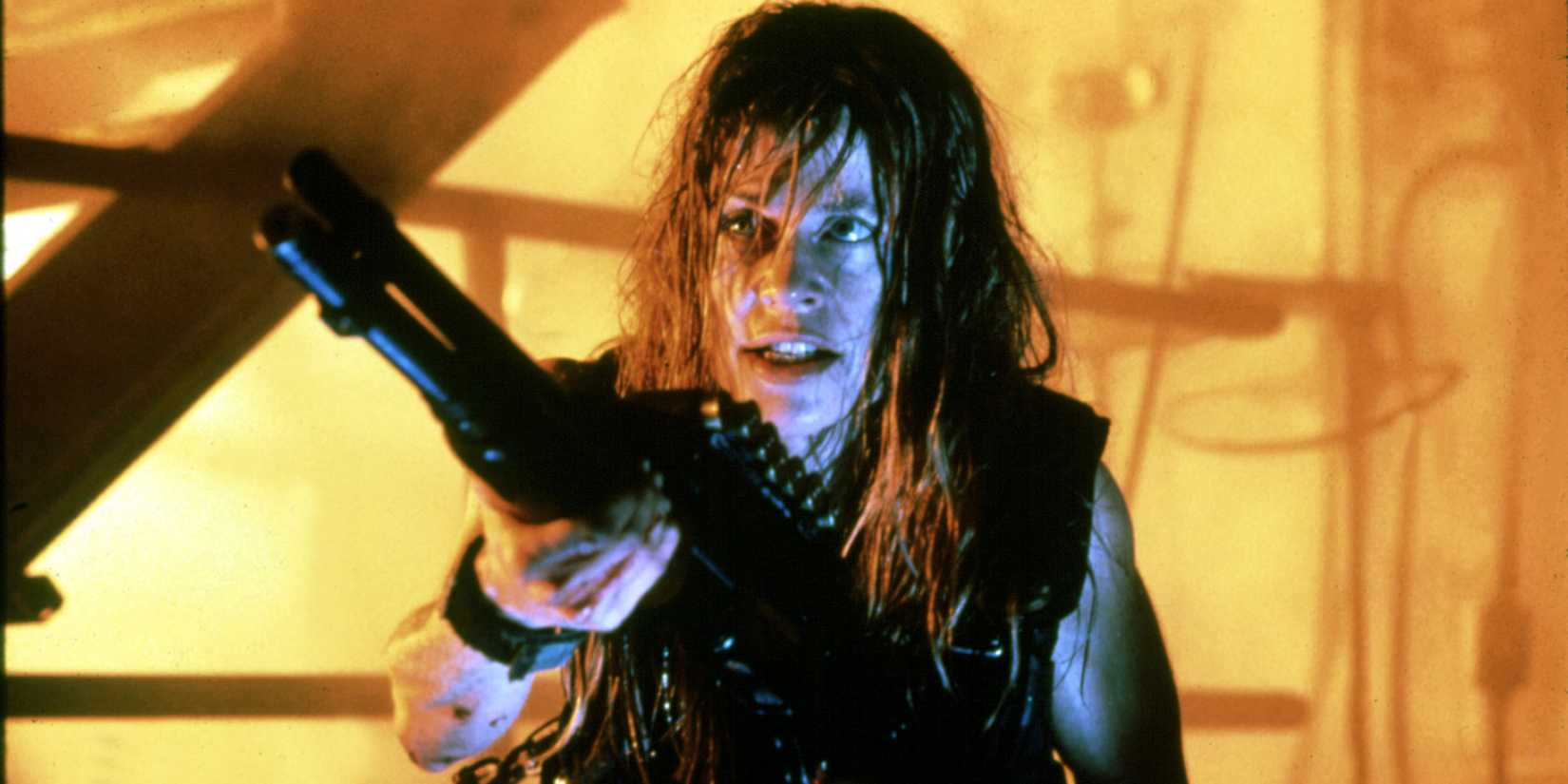Science fiction is an expansive genre that encompasses many different kinds of stories, all in one way or another centered on technology.There are science fiction films about alien technology, advanced futuristic human technology, and purely fantastical technology.
Sci-fi deals with the technology of war, and of exploration, and of imprisonment. In doing so, it raises some of the biggest philosophical questions that have ever been raised, and occasionally offers an answer.
Science fiction can amuse, and thrill, and terrify, and evoke wonder, and bring tears. But mostly, it provokes thought about technology, the future of humanity, and the very nature of the universe.
Ex Machina (2014)
What is consciousness? What does it mean to be human? Where should humanity draw the line in creating artificially intelligent beings? Are rich guys with god delusions going to be the death of us?
Alex Garland asks a lot of big questions in Ex Machina, because asking big questions is something science fiction movies do well, especially when they’re this thoughtfully written, meticulously directed, and immaculately acted.
The asking of those big questions does not in any way prevent Ex Machina from delivering as a psychological thriller, centered on one of movie history’s most memorable synthetic humans in Alicia Vikander’s Ava, a beguiling Frankenstein’s monster for the age of AI.
The visual effects used to create Ava still look great 10 years later, while the movie’s ideas become more terrifyingly relevant with each passing minute.
The word “magic” gets used way too much in connection with Steven Spielberg, but if there’s one film of his that warrants such a nebulous, frankly unhelpful characterization, it’s E.T. the Extra Terrestrial, the only blockbuster tear-jerking enough to inspire a schmaltzy Neil Diamond tune.
Heart lights the world over were indeed turned on by E.T., who in 1982 became a pop culture sensation as big as Pac-Man, Mr. T, and Michael Jackson. Much of the film’s enduring “magic” lies in its never having been given a legacy-trashing sequel, though Spielberg did briefly think about making one.
The cynic could easily dismiss E.T. as merely manipulative, but to do that would be underselling Spielberg’s genius for playing an audience. E.T. is populist filmmaking raised to art, through absurdly high-level command of craft, by a director of supreme confidence, and to be frank, utter shamelessness.
There is no movie image more iconic than E.T.’s flying across the moon shot. As heartwarming as the movie ultimately is, it’s easy to forget how genuinely harrowing it also becomes in the hands of movie history’s greatest thriller director (sorry Hitchcock).
Arrival (2016)
Jordan Peele thinks humans and aliens will never talk to each other, our differences being too profound. Denis Villeneuve might disagree, as Arrival presents a compelling argument in favor of mere Homo sapiens one day being able to commune with an extra-terrestrial intelligence, assuming there’s someone as smart and plucky as Amy Adams around to break through the language barrier.
Arrival might have been just a regular old good movie about humans learning how to talk to aliens, but the film’s ambitions carry it further, its narrative going non-linear as Adams’ brain is rewired to no longer experience time as a straight-line proposition. If Christopher Nolan wasn’t taking notes, he should’ve been, because Villeneuve out-Nolans even the master time-bender.
Villeneuve indeed pulls off an amazing feat with Arrival, crafting a science fiction film that’s narratively exciting, emotionally affecting, and seems to respect the science, making one believe that, yes, humans are smart enough to talk to aliens.
Invasion Of The Body Snatchers (1978)
It’s scary enough imagining a War of the Worlds-like alien invasion. But even more terrifying is the Invasion of the Body Snatchers scenario, where aliens don’t attack humanity with death rays, but replace them with mindless zombie-like pod people, one victim at a time.
Why aliens would bother doing this is beside the point. What matters is that the idea is truly horrifying, both on its face, and as a metaphor for all types of body- and brain-snatching, through indoctrination, brainwashing, or any other means by which one might lose their individuality.
1978’s Invasion of the Body Snatchers remake surpasses the 1956 original (which is still very good), thanks to improved special effects, an intelligent script, strong performances, and the direction of Philip Kaufman, who elevates the material above its pulpy origins, creating a genuinely unnerving sci-fi horror classic.
The famous final image of Donald Sutherland will remain forever seared into the mind of anyone who witnesses it.
The Terminator (1984)
Every now and then, a master filmmaker will announce their arrival by taking on a B-movie project and, through sheer determination (and some talent), making it into something far more special than anyone could possibly have expected. Spielberg did that with Jaws, and James Cameron did it with The Terminator.
To understand why The Terminator is a classic sci-fi action film, one need only look at its many woefully inferior rip-offs. The real-deal Cameron Terminator is among the most tightly-scripted action films ever made. It was also unique in its day for centering on a female protagonist who grows from a typical helpless victim into a robot-fighting badass.
Cameron’s most brilliant move, however, was casting Arnold Schwarzenegger as the T-800. The bodybuilding legend had the right physicality to play a relentless cyborg assassin, but he did more than just stomp through the movie uttering monosyllabic dialog, he made his killer robot weirdly charismatic, because he was weirdly charismatic.
The Day The Earth Stood Still (1951)
Science fiction reflects its times. In 1951, the atom bomb was on everyone’s minds, and The Day the Earth Stood Still delivered a cautionary message about the consequences a species could face for playing around with such technology. It would make a great double-feature with Oppenheimer.
Michael Rennie’s amused and vaguely patronizing attitude toward humans – he even treats the movie’s ersatz Einstein like a kid he wants to pat on the head – feels exactly right for a wise alien forced to explain how things are to an upstart species. The movie is smart enough to acknowledge that, if such a being were to visit Earth, we’d be unlikely to handle it well.
Nearly 10 years before Rod Serling changed sci-fi storytelling forever with The Twilight Zone, The Day the Earth Stood Still represented the best argument for the genre as something capable of delivering thoughtful storytelling for grown-ups. Indeed, it plays like an extended visit to the Zone, or perhaps the Outer Limits.
Planet Of The Apes (1968)
Planet of the Apes might be the greatest failed satire ever committed to film. Swiftian intentions may have fueled the film’s creation, but they evaporated under the heat of Charlton Heston’s complete lack of irony, leaving behind a more-or-less straightforward, incredibly entertaining, wholly serious-seeming science fiction adventure.
It is still possible to read Planet of the Apes as a satire, of course, but the film does not insist on it. It probably works better if one forgets about its possibly loftier intellectual aspirations, and gives oneself over to the wonderfully ludicrous story, which is just about a perfect sci-fi yarn.
The most perfect thing about Planet of the Apes is, of course, its ending. No spoilers for this movie from almost 60 years ago, but it’s a mind-blower. Heston’s performance in that climactic moment goes right up to the line of campiness, and then crosses over it, and then spikes the ball in its face.
Jurassic Park (1993)
Jurassic Park forever enshrined Laura Dern as the Queen of the Spielberg Gaze. This time it’s not aliens eliciting such brain-roasting astonishment, but dinosaurs (which might as well be big, lumbering, mute aliens).
It’s common to say that the dinosaur CGI in the original Jurassic Park, a 32-year-old movie, is better than most of today’s CGI, but this is misleading. The computer-rendered dinosaurs do hold up, but this is really a testament to how Spielberg integrates the CGI-created shots into the movie, more than to the quality of the VFX on their own.
Spielberg’s unparalleled visual storytelling sense and unrivaled skill at the art of the movie thriller are why Jurassic Park is still great after all these years. There are also the performances of Spielberg Gaze Queen Dern and her equally-gobsmacked co-stars, including a delightfully shirtless Jeff Goldblum.
Solaris (1972)
Steven Soderbergh made Stanislaw Lem’s great science fiction story Solaris into a middling psycho-drama. Andrei Tarkovsky made it into a masterpiece every bit as mysterious and intellectually challenging as the original book.
Tarkovsky’s film would not be so great if it were only about ideas. It also happens to be absurdly beautiful, mind-bendingly hallucinatory, and utterly devastating in evoking the overwhelming power of the unwanted, guilty memory.
But it contains some brilliant sci-fi ideas too, the biggest of which touches on the very nature of alien intelligence, and the unknowableness of the other. Jordan Peele might agree with Lem (Tarkovsky seems to have other concerns) that basic communication with another species is probably impossible, forget about ever comprehending them.
Denis Villeneuve might raise his hand in refutation of Solaris’ position on the unlikelihood of communing with aliens, but Arrival is an infinitely more optimistic film than Tarkovsky’s depressive fever-dream based on Lem’s staggeringly imaginative face-off with the otherworldly.
Terminator 2: Judgment Day (1991)
Making the evil robot the hero of the sequel was an innovation that deserved all the chefs’ kisses when James Cameron employed it in his Terminator follow-up. But it takes more than a single character change-up to make a great stakes-raising sequel (just ask the people responsible for M3GAN 2.0).
Cameron was already the greatest ever at dialing things up for the second one, after adding an “S” to Alien, but he elevated his reputation as the sequel-master with Terminator 2, which should really be called Terminator Times 10.
The term “expanding the lore” didn’t really exist in 1991, but that’s what Cameron did with Judgment Day, setting the stage for decades’ worth of disappointing Terminator movies made by people who are not as good as Cameron at understanding why a movie is good, and doing more of that in part 2, but not too much more.
Cameron keeps threatening to revisit Terminator with an emphasis on the AI side of things, but no disembodied machine super-intelligence will ever be as cool as Arnold Schwarzenegger in a leather jacket, brandishing a shotgun while tearing down the freeway on a motorcycle.
Source link



























Add Comment